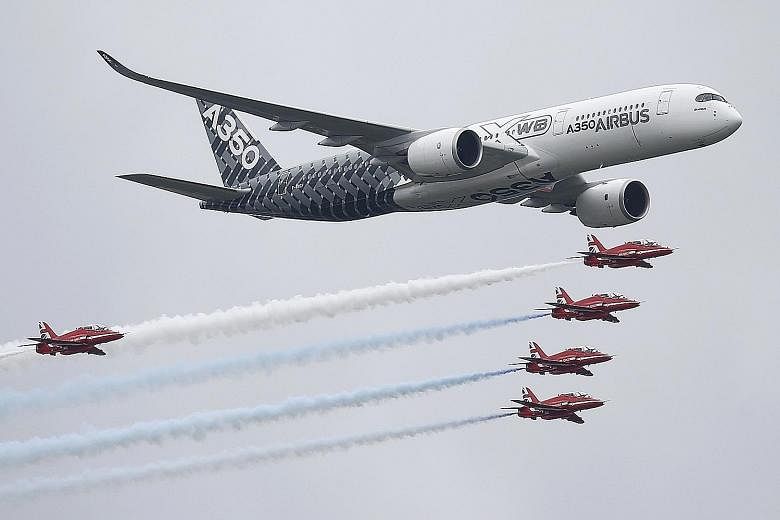LONDON • Aircraft orders plummeted this year at the Farnborough Airshow, where Brexit clouded the horizon and European giant Airbus slashed output of its A-380 superjumbo, figures released yesterday showed.
Show organisers said five days of business had yielded orders and options worth US$123.9 billion (S$167 billion), "defying industry expectations". The orders included 856 aircraft worth US$93.98 billion and US$22.7 billion for 1,407 engines.
The intake was, however, sharply down on the last edition of the world's biggest air show in 2014, which registered a record-breaking US$201 billion in orders.
Although Airbus started the show with a high-profile order of A-350 jets from Virgin Atlantic and Boeing expanded its 787 Dreamliner presence in China, there were relatively few orders for the industry's big jets, and none for the Boeing 777.
Airbus managed to clip Boeing's wings at the show, with AirAsia signing for 100 single-aisle, fuel-efficient A321neo jets, worth some €11.3 billion (S$17 billion).
-
$167b Deal value at 2016 airshow
$271b Deal value at 2014 airshow
Airbus commercial director John Leahy on Thursday unveiled US$35 billion of sales in all - US$25.3 billion in firm orders - for 279 planes.
Boeing notched up 182 sales worth a total of US$26.8 billion.
Airbus' announcement late last Tuesday that the Franco-German planemaker would halve A-380 production to one a month from 2018 caused some turbulence at the show, but chief executive Tom Enders said he hoped the cutbacks would last "just a year or two".
British engine-maker Rolls- Royce, a supplier of France-based Airbus, said it was worried about the commercial impact of Britain's vote to leave the European Union.
Boeing and Airbus were, however, bullish about their long-term prospects, with Asia and low-cost carriers keeping demand buoyant.
The show attracted on average 20,000 visitors a day before opening to the public for the weekend.
According to Deloitte, Farnborough and its sister Paris air show, held every other year, have produced an average of just over a quarter of annual airplane orders over the past decade. The number of firm deals inked at Farnborough was 216, though still-provisional ones would more than double that.
Now, the test is whether orders will hold intact and whether manufacturers can learn from past mistakes and deliver their record backlog of jet orders smoothly.
Deloitte says 13 per cent of the industry's massive order book is vulnerable to deferral or cancellation, but that jetmakers are cushioned by backlogs, which have swelled to six to 10 years from three to five years, thanks in part to deliberate overbooking.
Sources say the second half of that backlog is flimsier than the first and that many buyers have more flexibility than planemakers would like to admit publicly. "Are they orders or cheap options? That is what we are going to find out," said Mr Richard Aboulafia of US-based Teal Group.
AGENCE FRANCE-PRESSE, REUTERS

